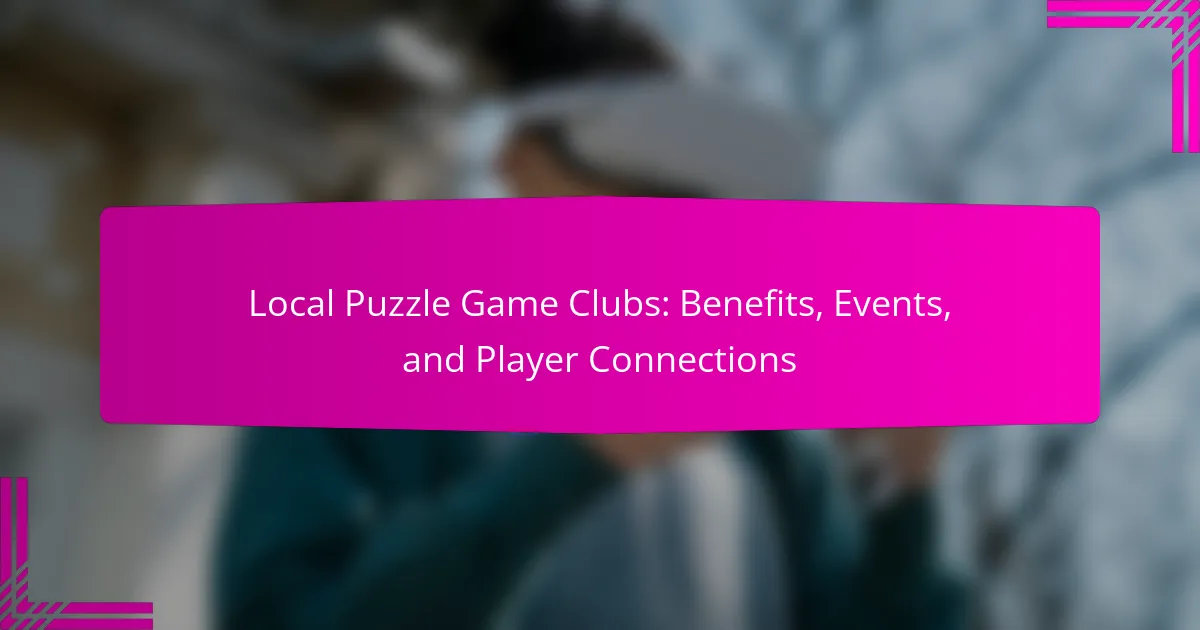Joining a local puzzle game club enhances social connections and cognitive skills. Members participate in engaging events, including tournaments and workshops. These clubs foster collaboration and provide opportunities for skill-sharing among like-minded individuals. Additionally, they create a community atmosphere that deepens player relationships and encourages teamwork.
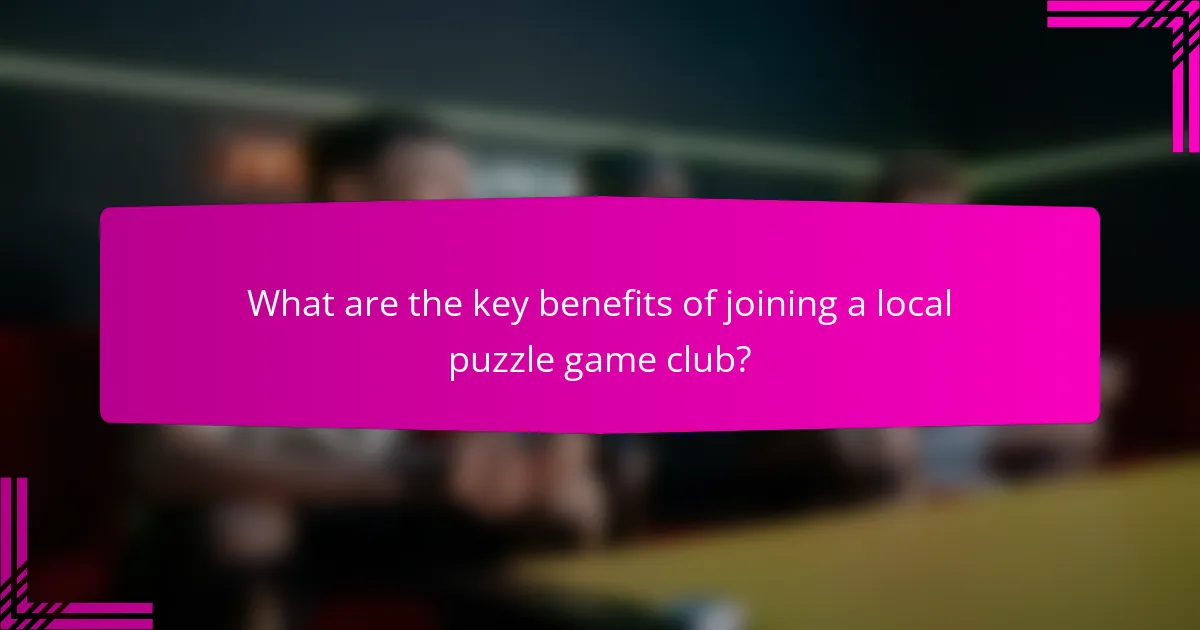
What are the key benefits of joining a local puzzle game club?
Joining a local puzzle game club offers numerous benefits, enhancing both social connections and cognitive skills. Members enjoy regular events that foster collaboration and friendly competition. These clubs provide opportunities to meet like-minded individuals, share strategies, and improve problem-solving abilities. Additionally, participating in a community can boost motivation and accountability, making puzzle-solving more enjoyable.
How do puzzle game clubs enhance social connections among players?
Local puzzle game clubs enhance social connections among players by fostering teamwork and collaboration. Players engage in group challenges, deepening friendships through shared experiences. Regular events, such as tournaments and themed nights, create opportunities for interaction and bonding. These clubs often attract diverse participants, promoting inclusivity and community spirit. As a result, members form lasting relationships that extend beyond gaming sessions.
What mental health benefits can players gain from participating in puzzle game clubs?
Participating in puzzle game clubs offers players significant mental health benefits, including enhanced cognitive skills, social connections, and stress relief. Engaging in puzzles stimulates critical thinking and problem-solving abilities, which can improve overall mental agility.
Social interactions within these clubs foster a sense of community, reducing feelings of isolation. Players often report increased happiness and reduced anxiety levels as they collaborate and compete in a supportive environment. Additionally, the focus required in puzzles can serve as a form of mindfulness, helping to alleviate stress and improve emotional well-being.
Overall, puzzle game clubs provide a unique platform for mental health enhancement through cognitive engagement and social support.
In what ways do local clubs foster a sense of community?
Local puzzle game clubs foster a sense of community by creating connections among players through shared experiences. These clubs organize regular events, such as tournaments and game nights, which encourage social interaction. Members often collaborate on solving puzzles, fostering teamwork and camaraderie. Additionally, clubs provide a supportive environment where players can share strategies and tips, enhancing their gaming skills while building friendships. This sense of belonging is crucial for player retention and satisfaction, making local clubs vital for community engagement in the gaming world.
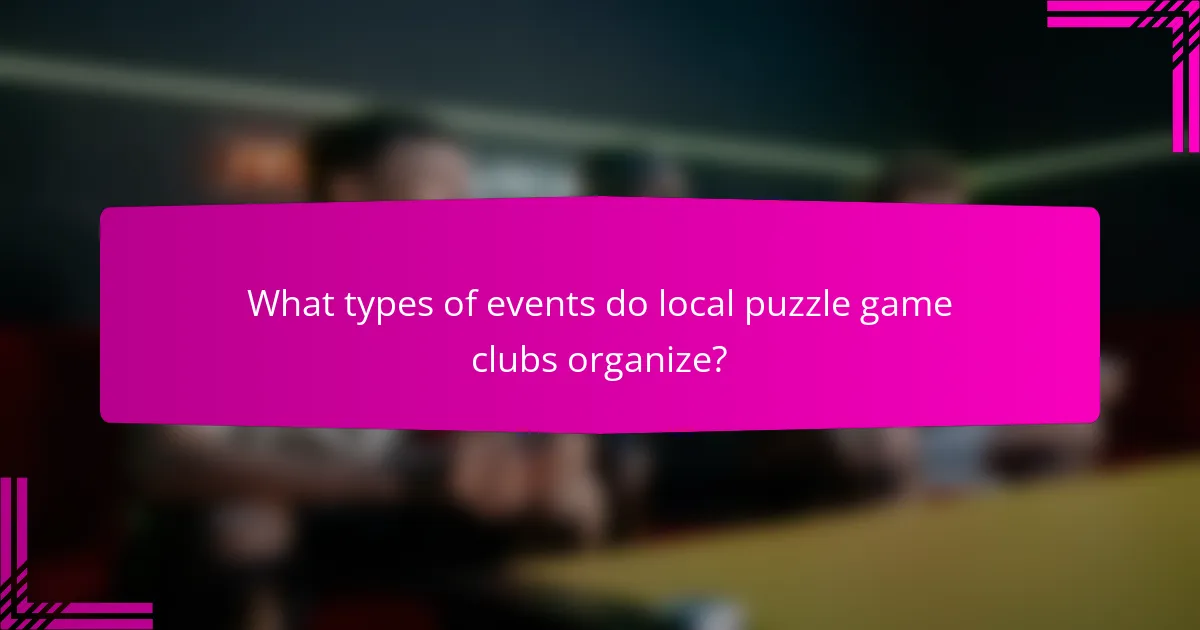
What types of events do local puzzle game clubs organize?
Local puzzle game clubs organize a variety of engaging events. These include weekly game nights, tournaments, puzzle-solving workshops, themed puzzle challenges, and community meet-ups. Each event fosters player connections and enhances teamwork skills. Players benefit from diverse experiences, including skill-sharing and networking opportunities.
How do tournaments and competitions engage club members?
Tournaments and competitions actively engage club members by fostering camaraderie and healthy competition. These events create opportunities for social interaction, skill development, and community building. Members bond over shared experiences, enhancing their connection to the club. Additionally, organized events often attract new players, expanding the club’s reach and promoting inclusivity.
What role do themed events play in attracting new players?
Themed events play a crucial role in attracting new players to local puzzle game clubs. They create engaging experiences that foster community and excitement. These events often feature unique challenges and prizes, enticing participants to join and connect with others. As a result, clubs can increase membership and enhance player retention through memorable interactions.
Which collaborative activities are popular in puzzle game clubs?
Collaborative activities popular in puzzle game clubs include group puzzle-solving sessions, themed puzzle nights, tournaments, and social meetups. These events foster teamwork and enhance player connections. Players often share strategies and tips, creating a supportive community.
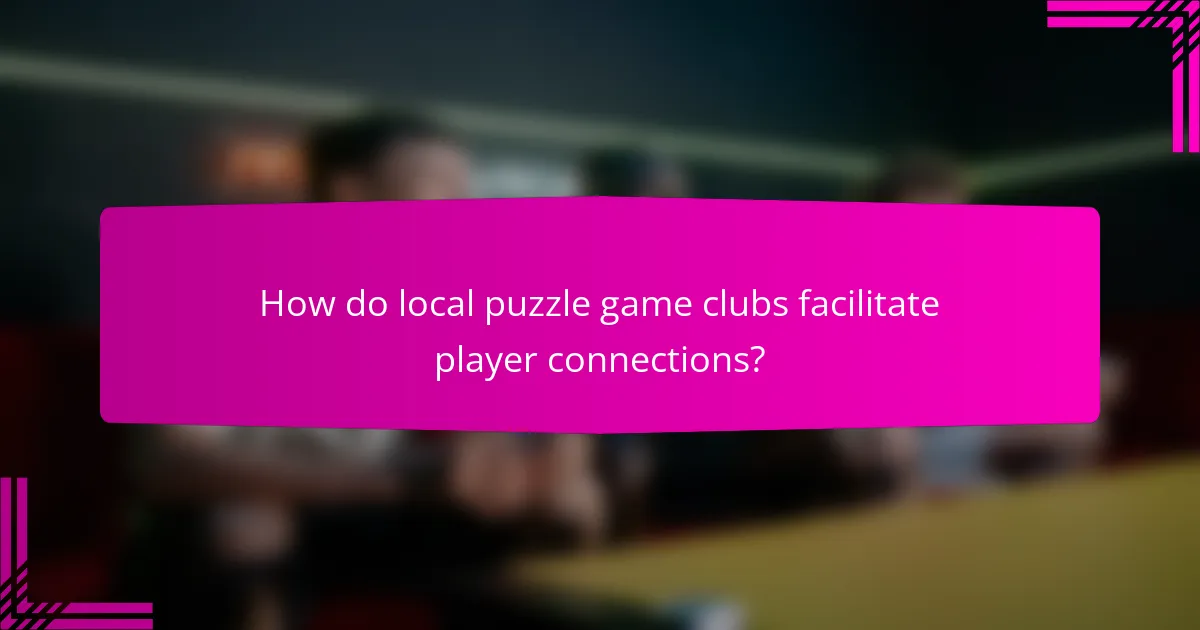
How do local puzzle game clubs facilitate player connections?
Local puzzle game clubs foster player connections by creating a community atmosphere that encourages social interaction. Players share strategies, collaborate on solving challenges, and build friendships through regular events and meetups. These clubs often host tournaments and themed nights, enhancing engagement and deepening relationships among members. The unique attribute of these clubs is their ability to connect individuals with a shared passion for puzzles, making them a vital part of local gaming culture.
What platforms do clubs use for communication and event planning?
Local puzzle game clubs primarily use platforms like Discord, Facebook Groups, and Meetup for communication and event planning. These platforms facilitate real-time interactions, event scheduling, and community engagement. Discord offers voice and text channels, while Facebook Groups provide a familiar interface for discussions. Meetup specializes in organizing local events, making it ideal for scheduling game nights and tournaments. Each platform enhances player connections and streamlines event management.
How can players find clubs that match their interests and skill levels?
Players can find clubs that match their interests and skill levels by exploring local community centers, online forums, and social media groups dedicated to puzzle games. Joining platforms like Meetup or Facebook can connect players with nearby clubs hosting events tailored to various skill levels. Additionally, attending local gaming events allows players to network and discover clubs that align with their preferences. Many clubs offer beginner sessions, ensuring inclusivity for all skill levels.
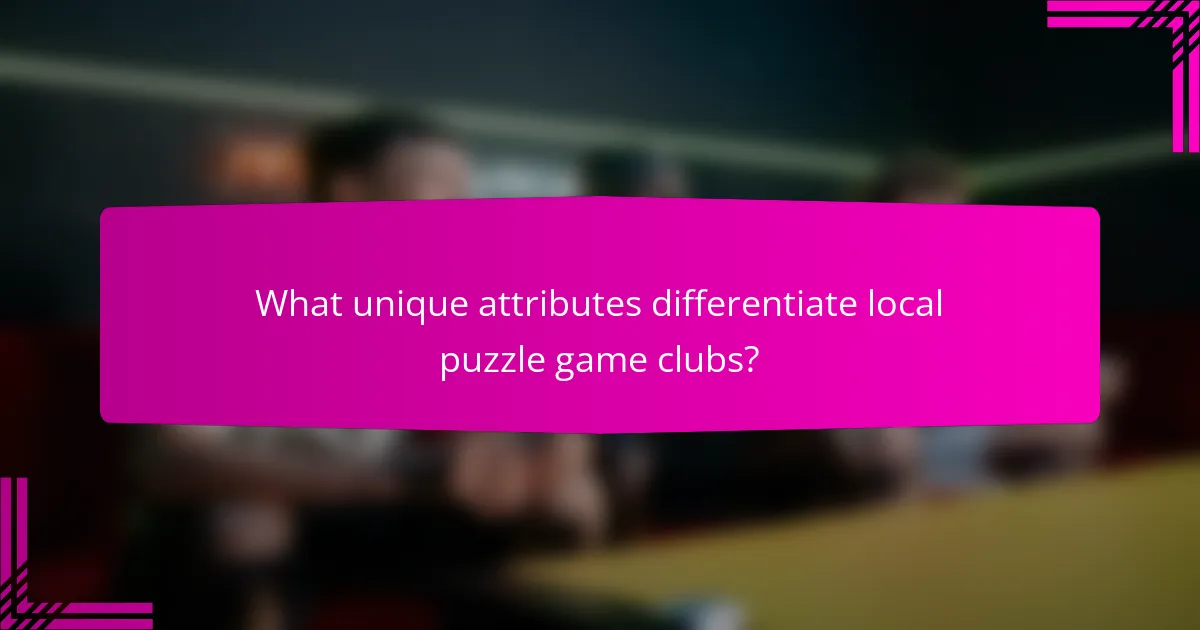
What unique attributes differentiate local puzzle game clubs?
Local puzzle game clubs differentiate themselves through unique attributes such as community engagement, themed events, and local partnerships. These clubs often foster a strong sense of belonging among players, encouraging collaboration and social interaction. Unique attributes include exclusive game nights, member-only tournaments, and personalized challenges that enhance the gaming experience. Additionally, clubs may offer rare opportunities like guest speakers from the gaming industry or collaborations with local businesses for promotional events.
How do regional variations influence puzzle game club activities?
Regional variations significantly shape puzzle game club activities by influencing member preferences, event types, and community engagement. Clubs in urban areas may host larger tournaments, while rural clubs might focus on casual meetups. Local culture impacts puzzle themes and challenges, fostering unique experiences. Additionally, regional demographics determine the types of puzzles popular among players, enhancing social connections and collaboration within clubs.
What unique challenges do local clubs face in member engagement?
Local puzzle game clubs face unique challenges in member engagement due to limited resources and competition from digital gaming. Many clubs struggle to maintain consistent attendance at events, as members may prioritize online gaming experiences. Additionally, fostering a sense of community can be difficult when members have varying levels of commitment and interest. Clubs often need to innovate their event formats to keep members engaged and attract new participants. Building strong connections among members is essential for sustaining long-term interest and participation in club activities.
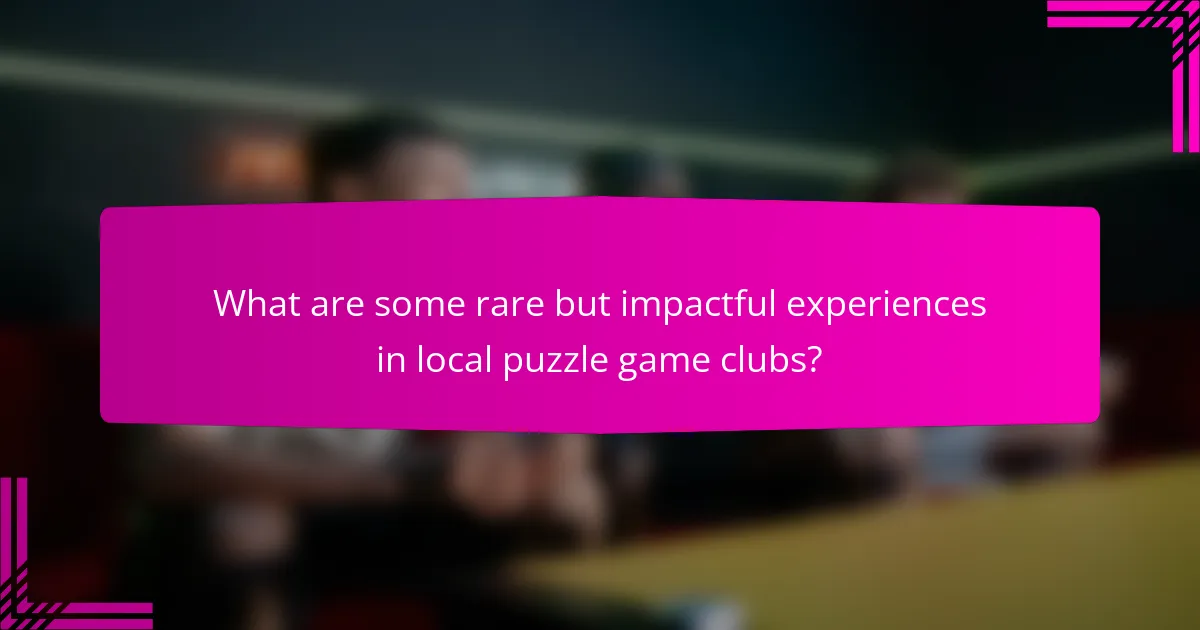
What are some rare but impactful experiences in local puzzle game clubs?
Local puzzle game clubs offer rare but impactful experiences such as collaborative problem-solving tournaments and themed escape room nights. These events foster deep connections among players and enhance teamwork skills. Unique experiences like guest appearances from game designers can inspire creativity and innovation. Additionally, clubs may host charity events that engage the community, blending fun with social impact.
What notable collaborations have emerged from local puzzle game clubs?
Notable collaborations from local puzzle game clubs include community tournaments, joint events with local businesses, and partnerships with educational institutions. These collaborations enhance player connections and foster a vibrant gaming culture. For example, clubs often organize charity events that bring together players and local sponsors, creating a sense of community while promoting puzzle-solving skills. Such initiatives not only elevate the gaming experience but also strengthen local ties.
How do clubs celebrate milestones or achievements in unique ways?
Local puzzle game clubs celebrate milestones through unique events that foster community and engagement. These celebrations often include themed tournaments, special game nights, and collaborative puzzle-solving challenges. Clubs may also recognize individual achievements with awards or certificates, enhancing player motivation. Additionally, social gatherings or potlucks create a festive atmosphere, allowing members to bond over shared interests.
What uncommon formats do puzzle game clubs experiment with?
Local puzzle game clubs experiment with uncommon formats such as escape room challenges, augmented reality puzzles, and themed puzzle nights. These formats enhance player engagement and foster community interaction. Clubs may also incorporate hybrid events combining digital and physical puzzles, allowing diverse participation. Unique attributes like collaborative problem-solving and time-based challenges create memorable experiences.
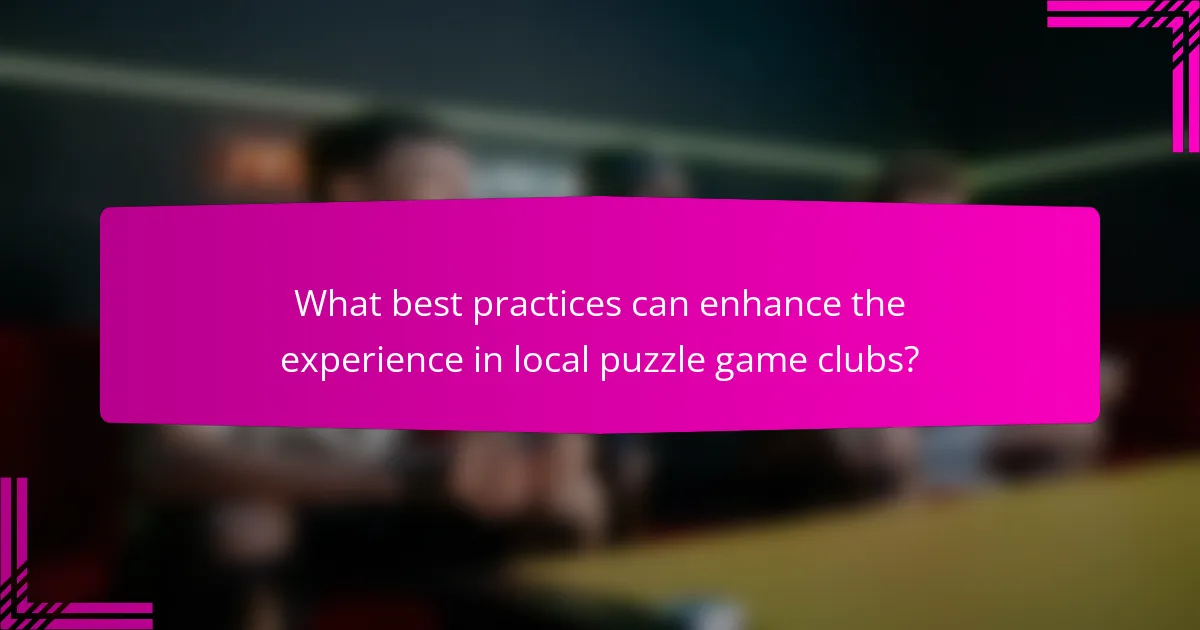
What best practices can enhance the experience in local puzzle game clubs?
To enhance the experience in local puzzle game clubs, focus on fostering community engagement, organizing diverse events, and encouraging collaboration.
Engaging club members through regular themed nights can create excitement and anticipation. Offering tournaments or challenges can motivate players to improve their skills while building camaraderie.
Additionally, incorporating feedback sessions allows players to voice their preferences, making them feel valued. Providing resources, such as puzzle-solving workshops, can also enhance skills and deepen connections among members.
Finally, utilizing social media platforms to promote events and share achievements can expand the club’s reach and attract new members.
How can clubs effectively recruit and retain members?
Clubs can effectively recruit and retain members by fostering a welcoming environment and offering engaging activities. Hosting regular puzzle-solving events attracts new players and builds a sense of community. Providing incentives, like exclusive member benefits, enhances retention. Regular communication through newsletters keeps members informed and engaged. Encouraging feedback helps clubs adapt to member needs, strengthening connections.
What strategies improve collaboration and teamwork during events?
Engaging participants through structured activities and open communication enhances collaboration and teamwork during events. Local puzzle game clubs can implement strategies like team challenges, role assignments, and feedback sessions to foster connections.
1. Team Challenges: Organize collaborative puzzles that require players to work together, promoting teamwork and problem-solving.
2. Role Assignments: Designate specific roles for members, ensuring everyone contributes their strengths and skills.
3. Feedback Sessions: Conduct post-event discussions where players share insights and experiences, reinforcing connections and improving future events.
4. Social Activities: Incorporate social gatherings to strengthen relationships outside of gameplay, enhancing overall club cohesion.
What common mistakes should clubs avoid to ensure a positive environment?
Clubs should avoid poor communication, lack of inclusivity, and neglecting player feedback to ensure a positive environment. Fostering open dialogue encourages collaboration and enhances player connections. Prioritizing inclusivity attracts diverse participants, enriching the club experience. Regularly seeking and acting on player feedback demonstrates commitment to improvement and member satisfaction.
